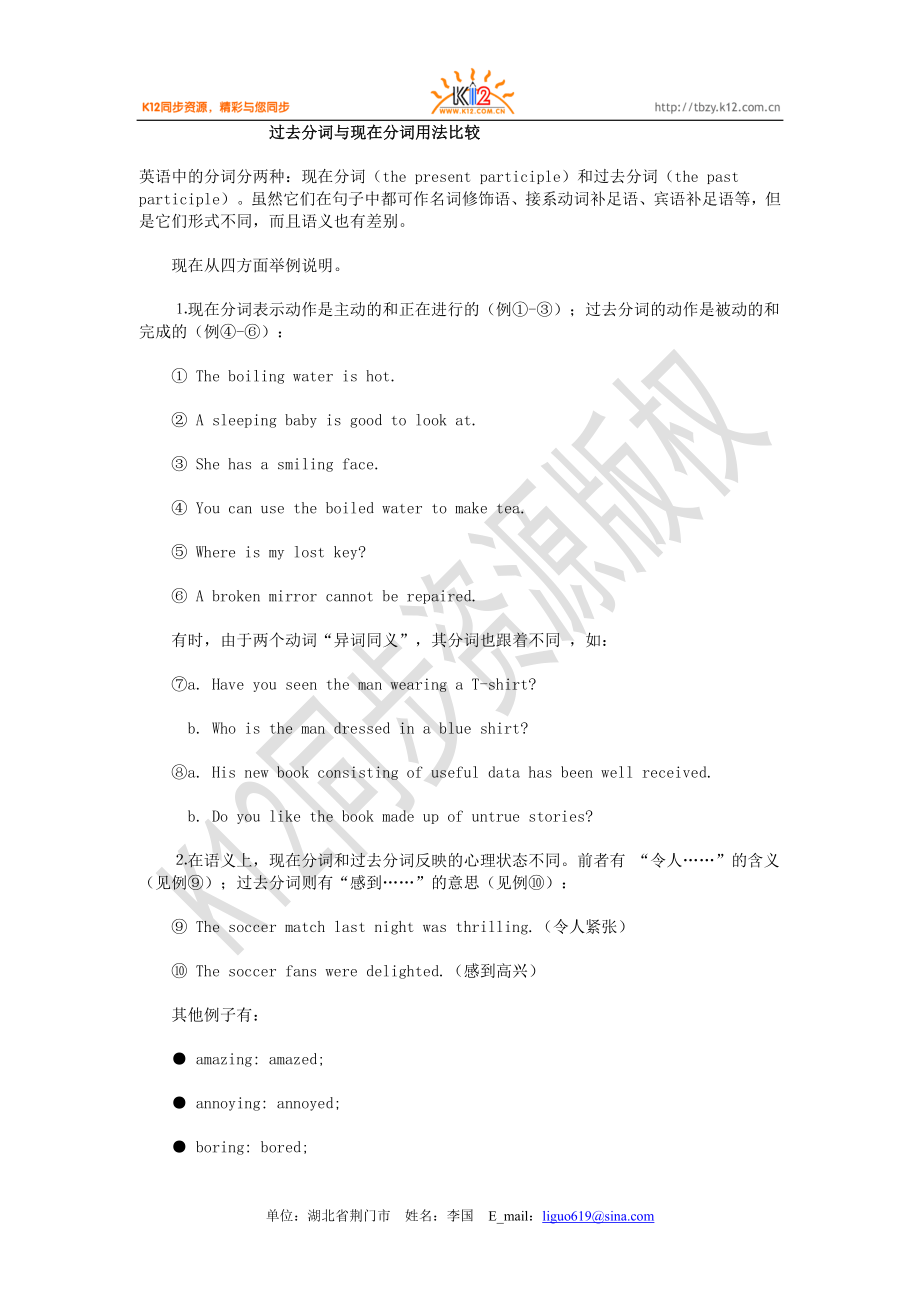《高二英語(選修八)unit 3 備課參考 過去分詞與現(xiàn)在分詞用法比較》由會(huì)員分享��,可在線閱讀���,更多相關(guān)《高二英語(選修八)unit 3 備課參考 過去分詞與現(xiàn)在分詞用法比較(2頁珍藏版)》請(qǐng)?jiān)谘b配圖網(wǎng)上搜索���。
1、
過去分詞與現(xiàn)在分詞用法比較
英語中的分詞分兩種:現(xiàn)在分詞(the present participle)和過去分詞(the past participle)�。雖然它們?cè)诰渥又卸伎勺髅~修飾語、接系動(dòng)詞補(bǔ)足語�、賓語補(bǔ)足語等,但是它們形式不同����,而且語義也有差別。
現(xiàn)在從四方面舉例說明����。
⒈現(xiàn)在分詞表示動(dòng)作是主動(dòng)的和正在進(jìn)行的(例①-③)���;過去分詞的動(dòng)作是被動(dòng)的和完成的(例④-⑥):
?��、?The boiling water is hot.
② A sleeping baby is good to look at.
?、?Sh
2、e has a smiling face.
?��、?You can use the boiled water to make tea.
?���、?Where is my lost key?
⑥ A broken mirror cannot be repaired.
有時(shí)����,由于兩個(gè)動(dòng)詞“異詞同義”,其分詞也跟著不同 ���,如:
?�、遖. Have you seen the man wearing a T-shirt?
b. Who is the man dressed in a blue shirt?
?���、郺. His new book consistin
3�、g of useful data has been well received.
b. Do you like the book made up of untrue stories?
⒉在語義上�,現(xiàn)在分詞和過去分詞反映的心理狀態(tài)不同。前者有 “令人……”的含義(見例⑨)��;過去分詞則有“感到……”的意思(見例⑩):
?��、?The soccer match last night was thrilling.(令人緊張)
?�、?The soccer fans were delighted.(感到高興)
其他例子有:
● amazing: amazed;
4���、
● annoying: annoyed;
● boring: bored;
● confusing: confused;
● surprising: surprised;
● terrifying: terrified
試比較11a和b以及12a和b:
11a. This is the most confusing system I have ever seen.
11b. The children will get confused if asked to learn too much at a time.
12a. D
5�、avid came with some surprising news.
12b. All were surprised at Sam's sudden resignation.
?、吃谧髻e語補(bǔ)足語時(shí),如果賓語是有關(guān)分詞邏輯上的主語�,就用現(xiàn)在分詞����,如:
13. The teacher found a student dozing off.
14. Don't keep the visitor waiting.
如果賓語和有關(guān)分詞有“動(dòng)詞+賓語”關(guān)系,那么這個(gè)分詞就要是過去分詞了�,如:
15. Where did you get your b
6、ook printed?
16. You should have your office whitewashed.
在13里��,正在打瞌睡的是賓語“a student”; 在14里��,賓語是 “the visitor”����。15里,“printed”的賓語是“books”; 16里����, “whitewashed”的賓語是“his office”。
4.分詞短語相當(dāng)于副詞從句����,但現(xiàn)在式表示的是主動(dòng)的行動(dòng)�,如例��,過去式表示被動(dòng)的行動(dòng)��,如:
17 Entering the room, she found the wall newly painted.
18 Written in haste, the essay had some errors.
單位:湖北省荊門市 姓名:李國 E_mail:liguo619@
 高二英語(選修八)unit 3 備課參考 過去分詞與現(xiàn)在分詞用法比較
高二英語(選修八)unit 3 備課參考 過去分詞與現(xiàn)在分詞用法比較

